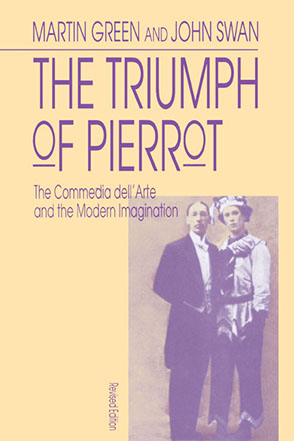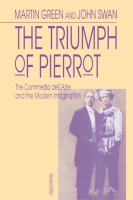
The Triumph of Pierrot
The Commedia dell'Arte and the Modern Imagination
Martin Green, and John Swan
The Triumph of Pierrot
The Commedia dell'Arte and the Modern Imagination
Martin Green, and John Swan
“What do Stravinsky, Degas, Chaplin, Isak Dinesen, Meyerhold, Monty Python, and T. S. Eliot have in common? What do such disparate work as Picasso’s Family of Saltimbanques," Bergman’s Sawdust and Tinsel, Waugh’s Put Out More Flags, and Pirandello’s Six Characters in Search of an Author share? As [Green and Swan] persuasively argue in their new book, all have been influenced by the Italian commedia dell'arte. . . . Exaggeration, artifice, and a self-conscious theatricality are commedia’s hallmarks; impertinence, mockery, and irony its weapons against the serious threats of the real world. No wonder, then, that commedia (along with the archetypes it supplies) exerted a fierce hold on the modernist imagination, and according to [the authors] left its imprint on virtually every area of Western culture from 1890 to 1930.”
- Reviews
- Bio
- Subjects
“What do Stravinsky, Degas, Chaplin, Isak Dinesen, Meyerhold, Monty Python, and T. S. Eliot have in common? What do such disparate work as Picasso’s Family of Saltimbanques," Bergman’s Sawdust and Tinsel, Waugh’s Put Out More Flags, and Pirandello’s Six Characters in Search of an Author share? As [Green and Swan] persuasively argue in their new book, all have been influenced by the Italian commedia dell'arte. . . . Exaggeration, artifice, and a self-conscious theatricality are commedia’s hallmarks; impertinence, mockery, and irony its weapons against the serious threats of the real world. No wonder, then, that commedia (along with the archetypes it supplies) exerted a fierce hold on the modernist imagination, and according to [the authors] left its imprint on virtually every area of Western culture from 1890 to 1930.”
“Green and Swan have given us an extraordinary interdisciplinary work. Using Diaghilev’s Ballets Russes, the saltimbanque paintings of Picasso and Schoenberg’s musical experiments as the starting point, they examine the modernist consciousness, which evolved from the 16th-century concept of the commedia dell’arte character of Pierrot, the original free-spirited revolutionary of European improvisational theater. Green and Swan are sweeping and occasionally breathtaking as they link the masters of modern literary culture to the tragicomic, grotesque traditions of the Harlequin: in literature, Rilke, Kafka, Brecht, and Weill; in art, Chagall and Rouault; in music, Stravinsky and Ravel; in film, Keaton, Chaplin, and the German expressionist montage of Lang and Wiene. From commedia to Caligari, the theme of this enormously provocative book is revolt and the modern spirit. . . . an intellectual tour de force.”
Martin Green is Professor of English at Tufts University.
John Swan is Head Librarian at Bennington College.
Mailing List
Subscribe to our mailing list and be notified about new titles, journals and catalogs.



